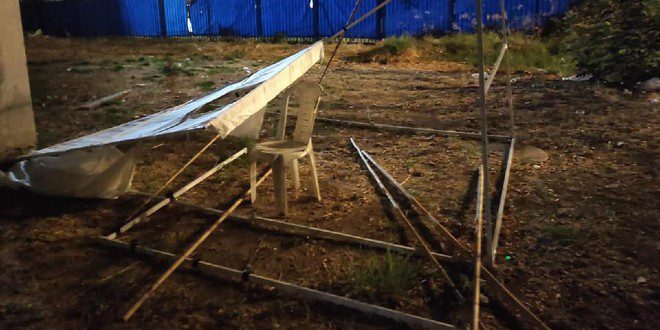For most of its history, Lod, composed of two-thirds Jews and one-third Arab, was a model of coexistence. That dream was shattered in May when the Arabs rioted, attacking Jews in the streets carrying out arson, stone-throwing, and vandalism. The Jews reacted, sometimes violently. Prime Minister Netanyahu declared a state of emergency in Lod on 11 May, marking the first time since 1966 that Israel has used emergency powers over an Arab community. At least three synagogues were targeted by firebombs.
After the 11-day conflict between Israel and Gaza ended, it seemed that the idealistic calm had returned to the seaside city. But this was not the case. As the final Jewish high holiday of Sukkoth rolled around, the Jews of Lod began to prepare by erecting Sukkoth (booths). Cases of rock-throwing were being reported as were dozens of cases in which Arabs destroyed Sukkoth. In many cases, the temporary structures were not only overturned but the materials from which they were built were destroyed.
Yedidyah Tzuckerman posted an image of one such Sukkah on Facebook with the caption, “The new branch of sport in Lod: destroying Jewish Sukkoth.
MK Nir Orbach responded to the post saying: “A lot of frustration and a lot of sadness. The Sukkah symbolizes our ephemerality and that we must trust our Father in heaven. May God stop the hand that corrupted this Sukkah and other Sukkot. And I demand that the Israeli police get their hands on the vandals. “
One case of rock-throwing carried out by three Arabs targeted a vehicle at Ganei Aviv bridge, not far from the place where Yigal Yehoshua was killed during the riots in May.
In addition, stones were thrown at a Sukkah built by Jewish residents in Ramat Eshkol, Jerusalem and vandalism was committed by Arabs in a sukkah on Givat HaZeitim near the Kinneret.
Israel has seen an uptick in terrorism recently. As a result, many rabbis came out with Halachic (Torah law) decisions suspending the requirement to sleep in the Sukkah during the holiday. Rabbi David Stav, the head of the Tzohar organization in Lod, ruled unequivocally:
“There is no question that in places where there is a fear of violence, i.e. in open courtyards or parking lots, that it is not required to sleep in the Sukkah. The situation in Lod is not good as there have been shootings in the last few nights.”
The rabbi emphasized that this ruling was specific for Lod and residents of other cities should ask the local rabbinic authorities.
The sight of fallen Sukkoth is reminiscent ofa verse in Amos which describes the end-of-days:
In that day, I will set up again the fallen booth of David: I will mend its breaches and set up its ruins anew. I will build it firm as in the days of old, So that they shall possess the rest of Edom And all the nations once attached to My name —declares Hashem who will bring this to pass. Amos 9:11-12
During the entire Sukkot holiday, there is a custom to include the prayer, “May the All-Merciful One establish for us the fallen Sukkah of David” in the benediction after meals.
The shortcode is missing a valid Donation Form ID attribute.




